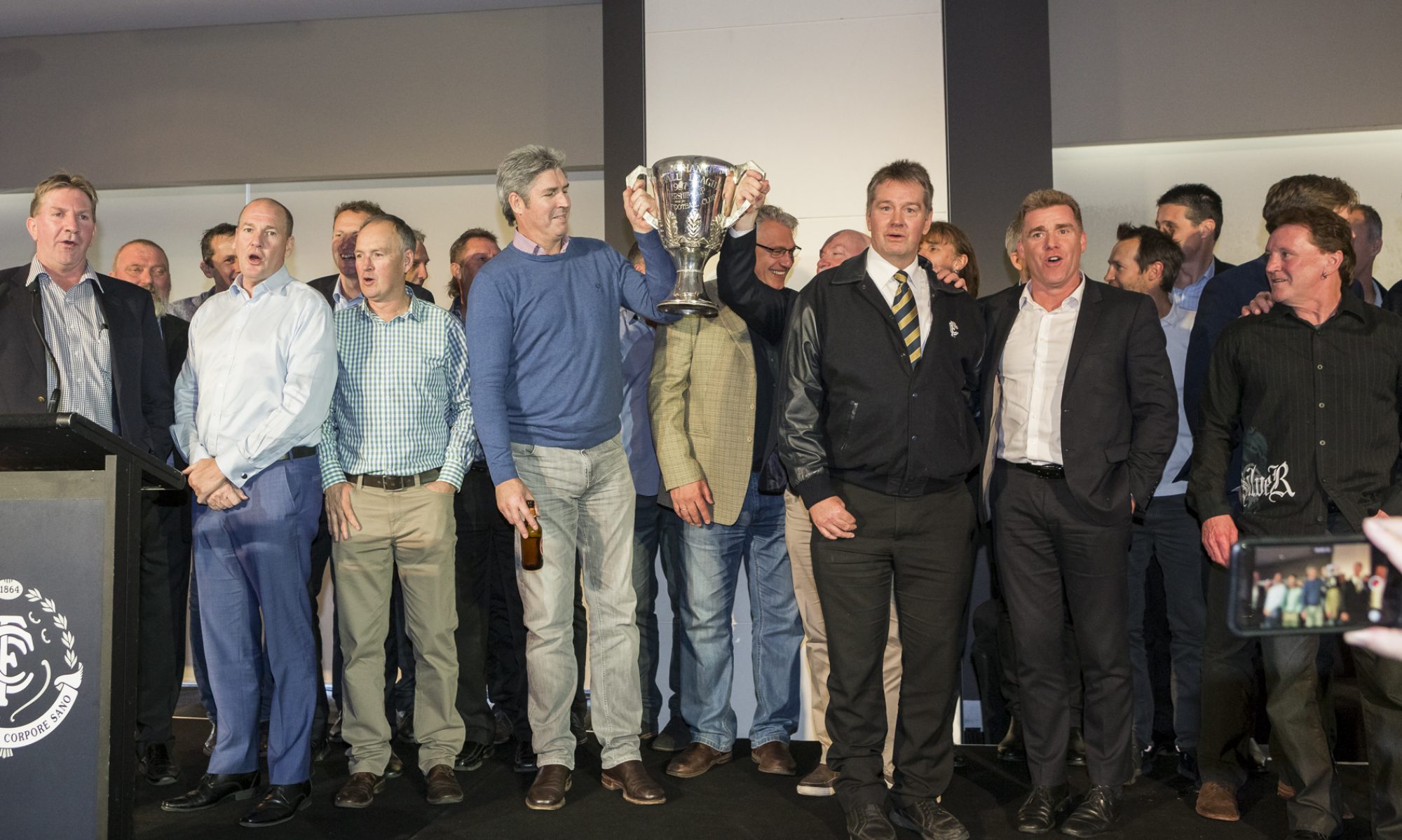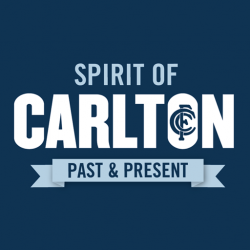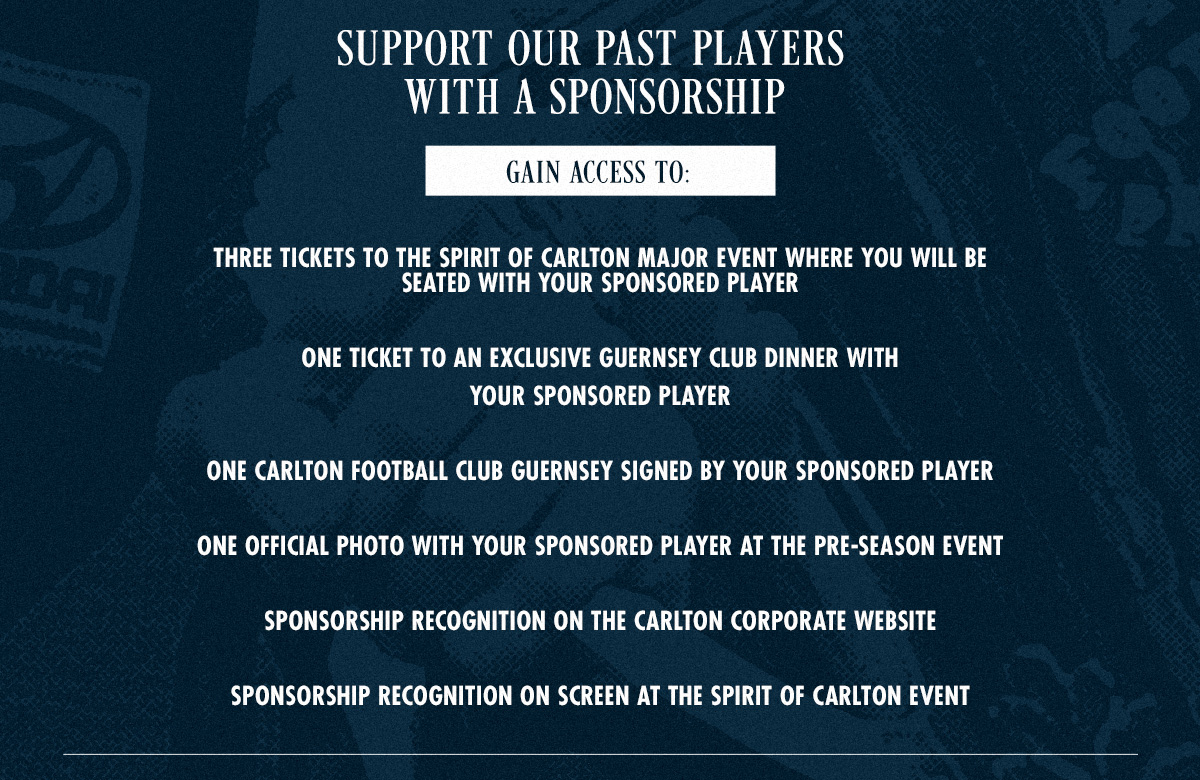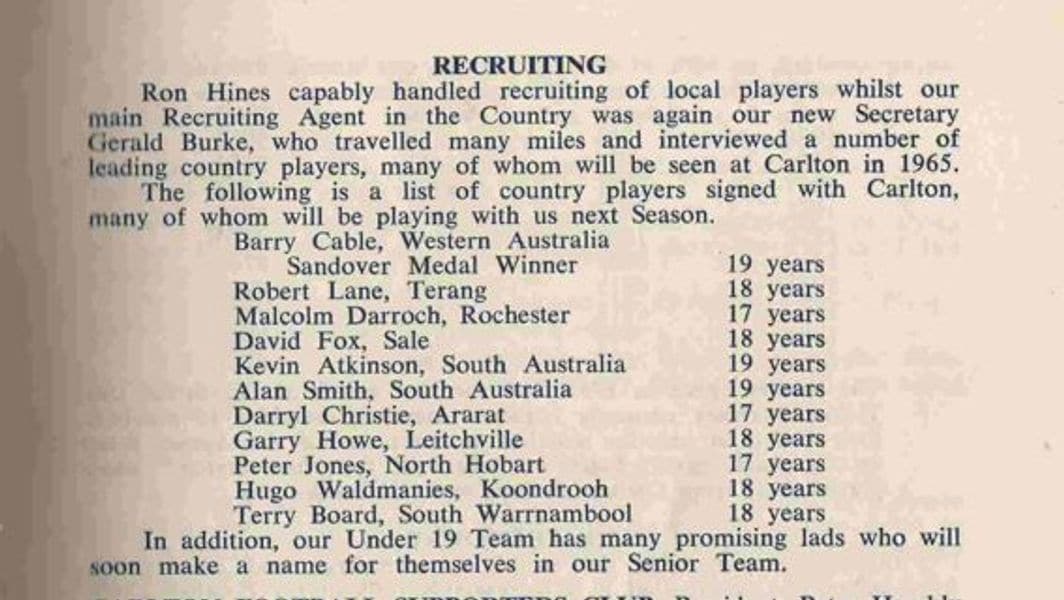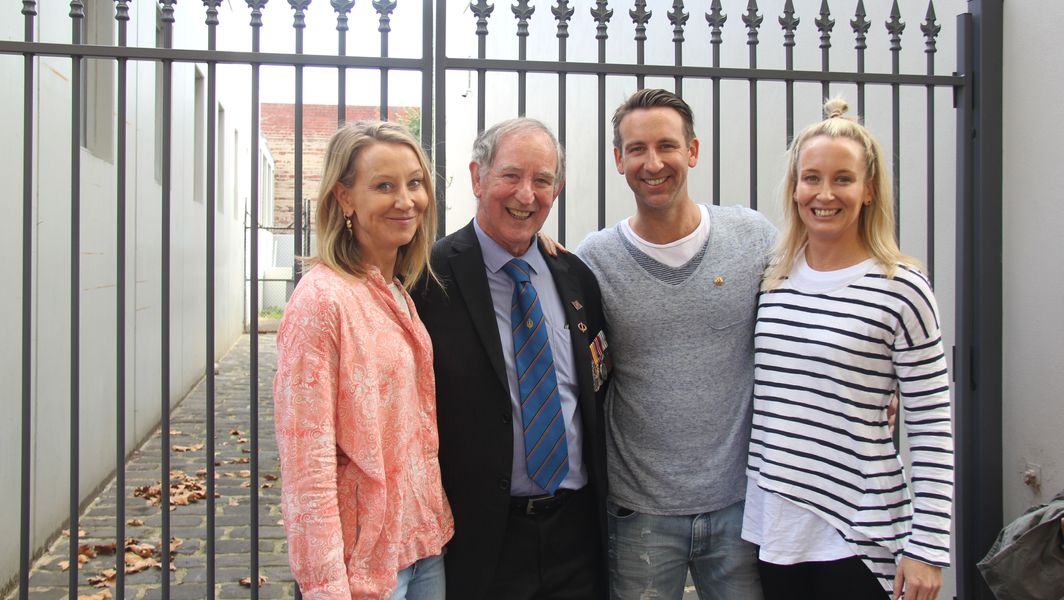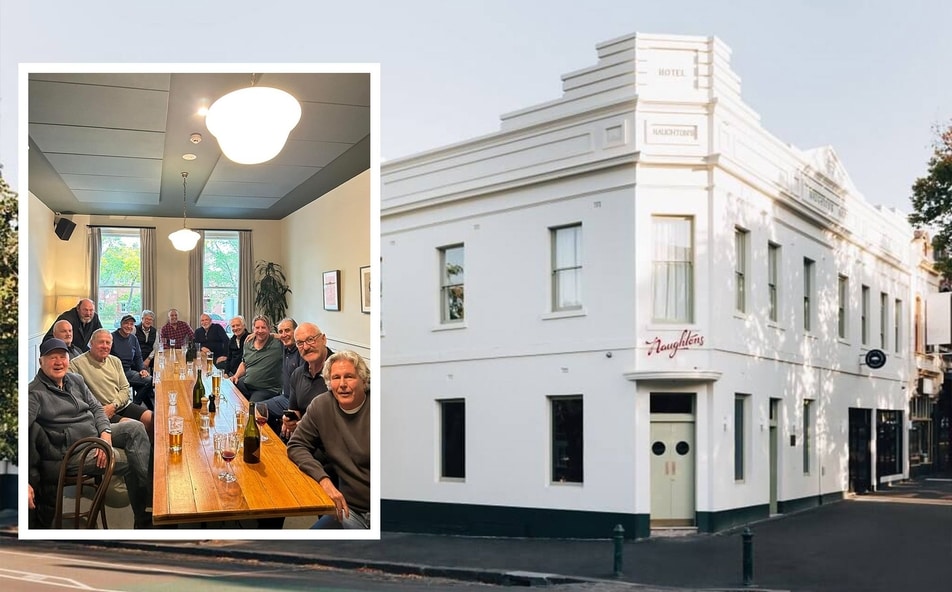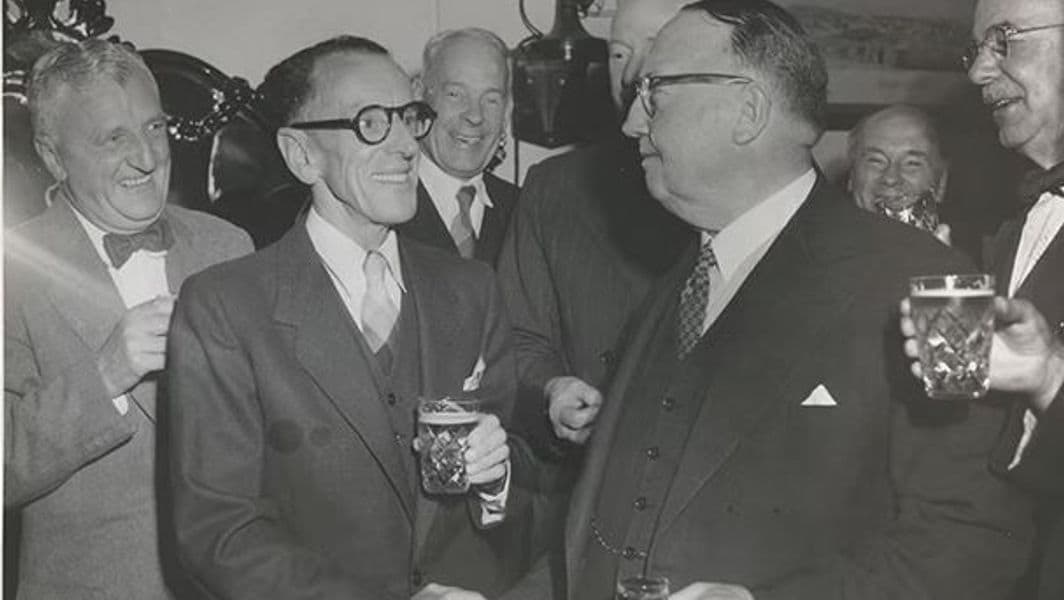Maurie Fowler – Latest Video
Ange and Kouta catch up with James Cook in Tassie
View this post on Instagram
Craig Bradley 1990 – Latest Video
Max Thomas – Latest Video
Chris Bond 1990 – Latest Video
Wayne Blackwell 1990 – Latest Video
Adrian Bassett 1990 – Latest Video
Tom Alvin 1990 – Latest Video
Hall of Fame 2024
View this post on Instagram
View this post on Instagram
View this post on Instagram
View this post on Instagram
View this post on Instagram
View this post on Instagram
Ian Aitken 1990 – Latest Video
Carlton greats gather for Life Members Luncheon
Greats of yesteryear gathered for the annual Carlton Life Members Luncheon on the eve of the 2024 season.

FORMER players and officials united by Navy Blue through the past eight decades of Carlton Football Club history have turned out in record numbers for what was the annual Life Members Luncheon at Kew Golf Club.
In what was a rare gathering of genuine Dark Navy royalty at the weekend, former Carlton premiership coaches, captains and players broke bread with former Presidents and officials in a gathering which attracted a total of 121 Life Members.
Present in the room was everyone from former Carlton premiership captain and coach John Nicholls, who completed his senior playing debut back in the opening round of 1957, through to Ed Curnow, the Club’s most recent retiree in the penultimate home-and-away game of 2023.
Carlton Premiership Captains Mike Fitzpatrick and Stephen Kernahan were also there – and joining Kernahan in his capacity as former President were fellow former Presidents Ian Collins and Mark Lo Giudice. Life Members who had passed away since last year’s Luncheon were also acknowledged – notably Ron Barassi, Dr. Don Hall, Ted Hopkins, Vivienne Kerr and Harold Mitchell (the latter having been advised of his Life Membership not long before his death).
“It’s very nice to be part of a community of ex-players when you’ve finished as a footballer. They are good people to be around,” said Curnow, who is now embarking on a career with Lorne as senior playing coach.
“I sat next to ‘Wow’ Jones who was very good to listen to . . . very entertaining. I think I need him down at Lorne footy club this year to straighten out a few of the players.
“It was also exciting to see Bruce Doull in the room, as well as old teammates Heath Scotland, Chris Judd and Brad Fisher.
“For me it was a pleasure to be part of a really unique experience. It made me realise there’s something bigger than just playing football.”
“We started in 2019 and this event has become bigger and better,” said former Carlton Chief Executive Officer Stephen Gough, who together with Frank Brosnan, Sharon McColl and Shane O’Sullivan convenes the Luncheon as part of his role with the Life Members committee.
“The attendees cover those admitted as Life Members from the ’60s to the current day, and it’s a great cross section of Carlton people,” Gough said.
The committee, with the support of the club, recently championed the recent installation of Life Members boards on the wall by the foyer inside Gate 6 at IKON Park.
Carlton Life Members Day
“It made me realise there’s something bigger than just playing football.”
Genuine icons.
From John Nicholls to Ed Curnow, it was a record-breaking turnout on the weekend for our annual Life Members Luncheon.
— Carlton FC (@CarltonFC) March 4, 2024
Past Player Sponsorship
View this post on Instagram
Interview with Brad Fisher – All the Champions Carlton Podcast
Our First Big Event of 2024 is on March 18th
Blueboy Bill convenes ‘Club No.2’ catch-up in Bendigo
Carlton’s current No.2 Lachie Cowan met Bill Redmond – Carlton’s oldest-known surviving player – during the Club’s community camp.

IT’S MORE than three quarters of a century since Bill Redmond – at 96 years, nine months and 258 days, the Club’s oldest known surviving senior player – last laced a boot for Carlton.
That happened in Round 5 of 1948 against Collingwood at Victoria Park – Redmond’s seventh and final game wearing the No.2 on his back.
Over the years, Redmond’s been photographed with other keepers of the number – amongst them his best man, the late Ken Hopper, from whom he inherited the number, and the great John Nicholls the games record holder in it.
Today, in La Trobe University’s Sports Stadium not far from his home in Flora Hill, Bill fronted up to meet with Carlton’s current No.2 custodian – boyhood Blue Lachie Cowan, a participant in the Club’s 2024 AFL Community Camp.

Two Navy Blue No.2s: Carlton player No.620 Bill Redmond and player No.1234 Lachie Cowan.
“I still love the Club and with the boys heading here, I couldn’t pass up the opportunity,” said Redmond, sporting the No.620 medallion on his lapel as Carlton’s 620th player to complete his senior debut since 1897.
“I’m having a bit of trouble walking with my balance right now, but my son Philip, who lives next door, helped get me there.
“There were people everywhere but I got to meet Lachie and that was terrific. I gave him a souvenir of the ’47 premiership, a pennant with the players’ names on it. I had a photo taken with Lachie and also with the captain Patrick Cripps, who was kind enough to say hello. By gee he’s tall.”

Redmond shares some Carlton memories with his current-day contemporary.
The Carlton of today is so very different to the Carlton of Redmond’s youth – a case in point the club’s balance sheet of 1948, a copy of which he recently perused. As he said with some amusement: “It cost around £9,000 ($18,000) to run the whole club back in ’48. Now players are getting a million a year”.
Born William George Arthur Redmond in North Melbourne on 29 May 1927, Bill spent his formative years in nearby Brunswick, finding work as an engineering pattern-maker between games of football and cricket.
Accepting an invitation to join the Carlton under 19s in its inaugural season of 1946, Redmond earned the Ken Luke Cup as the team’s best player afield in its Grand Final loss to North Melbourne. Not long after, he was adjudged joint Best and Fairest with Ron Dunn – “and I don’t mind telling people that Richard Pratt, Sergio Silvagni and Adrian Gallagher were winners after me”.
Redmond’s recollections of those Carlton days are all fond ones, particularly the pleasant Sunday mornings “when they put on biscuits and cheese”.
“I remember that the senior coach Percy Bentley was interested in trap shooting, and one day he arranged for a driver to take every member of the team on a trap shooting trip,” Redmond said.
“We all climbed into the back of this old furniture van with drop-down sides and we took off up the bush somewhere. Anyway, the driver failed to negotiate a bend in the road and the van rolled over. The paper never picked it up, but every player could have been killed. As it happened we all got out of it okay and the only person hurt was Mrs Bentley, Percy’s wife.”
A marvellous raconteur, Redmond related another untold tale involving the spiteful 1945 Preliminary Final between Carlton and Collingwood at Princes Park – a portent of what was to come in “The Bloodbath”.

Carlton captain Patrick Cripps meets Bill Redmond.
“Before I played for the Carlton under 19s I used to turn up at Princes Park in the days when they opened the gates and you’d get in for nothing at three quarter-time,” Redmond said.
“I remember fronting up to the preliminary final at three quarter-time, with Collingwood 28 points up – a lead they stretched to 34 when one of their players booted the first goal of the last quarter.
“It was then that an absolutely magnificent little player named Jimmy Mooring came on and turned the game.
“Now Jimmy was a barman in Bendigo, but when I joined Carlton we became teammates and I remember asking him about that game. He said ‘Let me tell you something. I was 19th man sitting on the bench and at three quarter time Percy Bentley said ‘Look Jim we’re in trouble. I want you to go out there in the last quarter and cause a stir’’.
“Did he cause a stir.”
Redmond added that Mooring told him that he charged on to Princes Park, “went bang and dropped a Collingwood player”.
“From then on, every other Collingwood player was only worried about catching me to even up, and in the end we made them pay.”
Carlton overcame the Magpies to win the prelim by 10 points – in no small part through Mooring’s act – and seven days later rolled South Melbourne by 28 in the big one.
Redmond’s maiden season at Carlton was a premiership season – and while he never made the final cut for the ’47 team which prevailed by a point over Essendon, he is the last man standing of the 20 who formed a guard of honour when the ’47 premiership pennant was unfurled at Princes Park in Round 2 of the following year.
“I can remember carrying my Gladstone bag to the match, getting changed and being told to run out onto the ground for the unfurling of the pennant,” Redmond recalled.
“I was the youngest player in that team of course. I stood next to Bert Deacon, who was probably as good a Carlton player as there was in my time there, although ‘Chooka’ Howell was a good player.”
The unfurling of the 1947 premiership pennant: Bill Redmond, the only surviving member who took to the field that day, is the third player from the left.
Through 1948, Redmond established himself as a regular member of the senior team, out of a back pocket alongside the champion full-back Ollie Grieve.
He strung together five matches in succession, until mid-May when rival club North Melbourne protested to the VFL that Carlton had signed Redmond in contravention of the League’s zoning rules. Redmond, it seemed, lived on the wrong side of the street in West Brunswick, which served as a boundary between the two club zones – and in the end the VFL sided with the Shinboners, and revoked Redmond’s playing permit.
North was intent on getting Redmond to Arden Street, and flatly refused him a clearance to Carlton. The Blues, in turn, dug in their heels and ultimately Redmond signed with Williamstown, which trumped both clubs by almost doubling his match payments.
At Williamstown, Redmond lined up at full-forward in the Seagull’s 1948 Grand Final team that lost to Brighton. Then in 1950 he transferred to Bendigo Football League club Eaglehawk, before joining North Bendigo in the Heathcote District Football League as captain-coach two years later.
Redmond, whose sister Rose is the grandmother of Geelong’s Grand Final-winning Guthrie brothers Cameron and Zach, was voted Best and Fairest in the HDFL in 1954, then switched to South Bendigo to star in its ’56 premiership team. Premierships also followed at Inglewood in 1958 and South Bendigo reserves in ’59 and ’60, and Redmond served as captain-coach in all three.
By 1963 Redmond was chasing the leather for Bridgewater where he savoured further Grand Final glory and took out the League’s goalkicking honours with 51.
The following year, he hung up the boots at the ripe old age of 37 – and his love for Carlton has never waned.

Bill Redmond holds his old player photo from 1947.
Tributes pour in for Mitchell, with Carlton Life Membership confirmed
The Carlton Football Club is mourning the passing of significant contributor, Harold Mitchell.

THE depth and breadth of Harold Mitchell’s power and influence as a media buyer, advertising icon and dedicated philanthropist has been fittingly acknowledged since his sudden passing on Saturday following knee surgery.
Less well known was Mitchell’s quiet but significant contribution over many years to the Carlton Football Club, notably towards its redevelopment, gender equality and community programs – which is to now result in him being awarded Life Membership posthumously.
Though he didn’t live long enough to receive his Life Membership in person – the 81-year-old was to have been presented at the Spirit of Carlton Hall of Fame induction on March 18 – Mitchell was recently told by his lifelong friend and fellow advertising magnate David Nettlefold that the Board of Directors had seen fit to bestow Life Membership upon him.
“I was able to tell him a week before his operation that he was to be awarded Carlton Life Membership and he was rapt because he significantly contributed to Carlton. In the days when games were played there he always had a corporate box and he availed his plane to take Carlton and AFL people to places like the Northern Territory,” Nettlefold said, who was himself awarded Life Membership in 2020.
“He was a committed philanthropist, he gave away millions to the poor and needy, and he was an incredible man. A great man.”
In the days since his passing, Mitchell’s life has been lauded by anyone and everyone from the Prime Minister down for his incredible impact on society, notably through the Harold Mitchell Foundation, in support of health, education, the arts and sport.
Along the way he also served as chair or board member of august organisations including the Florey Institute of Neuroscience and Mental Health, the New York Philharmonic, the National Gallery of Australia, the Museum Board of Victoria, Opera Australia, CARE Australia, the Melbourne Symphony Orchestra, Tennis Australia, the Deakin Foundation, the Melbourne International Festival of Arts and the Australia-Indonesia Centre.
But Nettlefold, in reflecting on Mitchell’s life, identified modest beginnings.
“He came from a humble background, a sawmilling family in Stawell, and he moved to Melbourne when he was 20. He applied for a job with an advertising agency in the city – and the rest, as they say, is history,” Nettlefold said.
“When Harold and I first came together the one thing we had in common was that we were Carlton diehards from an early age. We go back 60 years, to when Harold gave me my first order in advertising through a media buyer D’arcy MacManus in Queens Road. He gave me my first billboard space for Uncle Ben’s.”

For The Love Of The Ground wall, featuring plaque acknowledging Harold Mitchell AC.
Nettlefold acknowledged Mitchell’s resilience in overcoming his own personal demons, and his hard, but fair industry philosophy.
“Harold was a smoker and a drinker in the early stages of his life, which he overcame, and he had a problem with his weight which he also fought,” Nettlefold said.
“In business he was a fearsome competitor and he reorganised the advertising agency. He brought all the small ad agencies together as one so they could get a bigger deal with the corporations, which is exactly what happened.”
Former Carlton President Mark LoGiudice, who was instrumental in leading what was the greatest infrastructure redevelopment ever to occur at IKON Park, acknowledged Mitchell’s incredible support as both friend and mentor at the time he assumed the Presidency in 2014.
“With the passing of Harold Mitchell, Carlton has lost a good friend,” LoGiudice said.
“It was through David Nettlefold and our passion for the Carlton Football Club that we came together, around 10 years ago. I had just become President and I think it was more Harold’s curiosity in knowing what was going on at the Club that we first met.
“Harold and I spent a lot of time talking about Carlton. He was always keen to know what was going on with all our teams, our people and our community programs, and he had a very keen interest in the redevelopment. He was a great sounding board given his experience and his wisdom in life. He was around a long time and achieved much in his life.
“He was a very smart person and a very generous person. He had a big heart. In the end he made a significant contribution to the Carlton Football Club – and he left a legacy on it and many other organisations around Australia and the world.”
In the foyer at IKON Park, by the premiership trophies, Hall of Fame wall and Legends Locker Room, can be found a tangible reminder of Mitchell’s seismic contribution to Carlton.
Inscribed on a perspex plaque by the wall appropriately marked “For The Love Of The Ground” are the following words:
In recognition of
HAROLD MITCHELL AC
who significantly contributed to the redevelopment
of IKON Park and the Spirit of Carlton.
The story of Daryl Christie — Carlton’s first known Vietnam veteran
Only recently has Carlton become aware of a reserve-grade player who served in the Vietnam War.
Blues greats relive old times on eve of Naughton’s 150th celebrations
Carlton’s revered premiership players of the 1980s headed to Naughton’s on the eve of its 150th anniversary.
